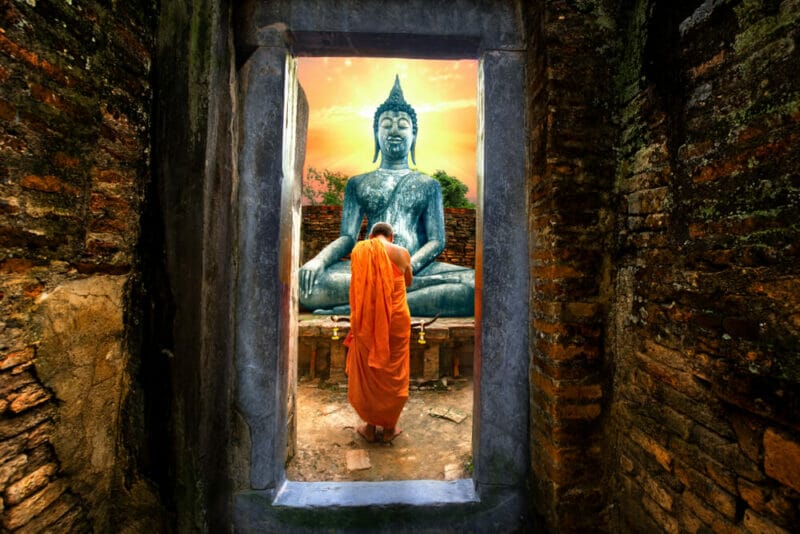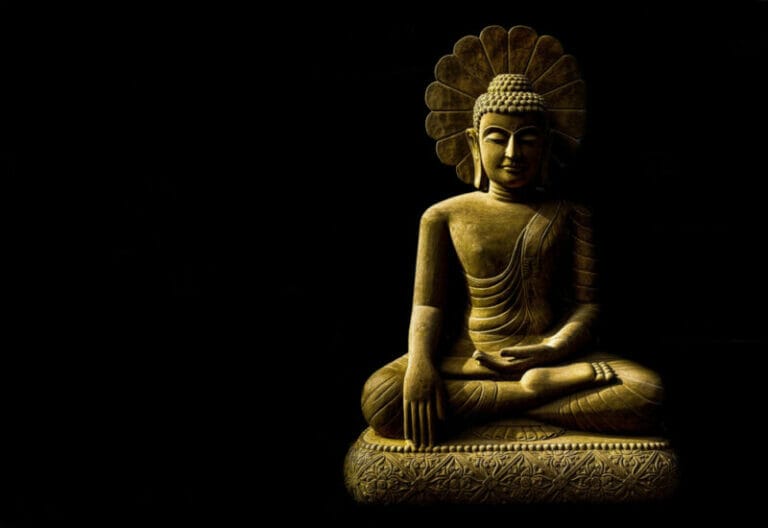From Dawn Till Dusk: The Daily Worship Habits of Buddhists
For Buddhists, worship is a way of expressing their gratitude for life, for the guidance of their teachers, and for the blessings bestowed upon them.
Worship can also be an opportunity to purify one’s mind and body, to become more mindful, and to meditate. Buddhists may worship by offering flowers, incense, lighting candles, or making offerings of food.
In addition, many Buddhists also take part in ceremonies to honor the life of the Buddha.
During childhood, rituals and rules of worship are taught in the family setting. As soon as a young Buddhist is familiar with the rules of rituals, he/she can perform them both in the temple and at home.
Buddhist countries follow lunar calendars and thus there are no fixed days on which worship is held.
How Does a Buddhist Schedule Worship?
The Buddhist religion is a pretty diverse tradition with many different sects, each of which has its own approach to worship.
Buddhist worship can be as often or infrequent as one chooses to do so. Some choose to pray and meditate every day, while others may only do it once a week or month. It is up to each person’s preference how they would like their spiritual life to look like.
On a broader scale, followers of Buddhism worship informally every day and formally on special occasions.
Buddhist worship typically is not limited to only one activity. Buddhists meditate, chant, and live a life of service so all of these are considered worship in Buddhism.
What makes it difficult to answer this question is that there are many individuals who practice various forms of Buddhism with different philosophies so it’s hard to speak on behalf of an entire group!
“Puja” sessions are performed at home by the worshipers seated in front of images of Buddha, barefoot. Out of respect for the Buddha image, worshipers place their feet far away from the image. Then in remembrance of the Buddha, the group read his praises. This kind of prayer is referred to as “Buddha Vandana.”
Typically, it is performed at home three to four times a day, in the morning, before lunch, in the evening, and before going to sleep. Meditation and reading of Buddhist texts are also practiced.
On the other hand, Buddhism has different sized temples. These temples are called pagodas in China and Japan. Buddha’s image or statue is a prominent feature of all Buddhist temples.
Every month, Buddhists observe religious holidays on specific days. During these special days, Buddhists flock to the temple in large numbers.
Buddhist years are based on lunar phases. Consequently, the new moon determines the beginning of every month. Based on this calculation, each month will contain 29 or 30 days.
That is why the Buddhist calendar has 10 less days than the Western one. Buddhists attach great importance to the full moon or new moon of every month.
More detailed information about the special Buddhist occasions can be found in the following article:
http://www.primaryhomeworkhelp.co.uk/religion/buddhistfestivals.htm
According to Buddhism, life is a continuous cycle of birth-life-death-rebirth. It’s a never-ending cycle, since you’ll reincarnate after death. Buddhists believe that the only way to break this cycle is to become enlightened through “Sādhanā”.
The process is continuous and doesn’t have a timetable attached to it. Everyone is welcome to engage in prayer/meditation/sadhana at any time. But the special occasions for praying are there only to preserve the spirit of Triratna (the Buddha, the dharma, and the sangha) in every Buddhist’s heart.
You can also find Buddhist around the world who live ascetic lifestyles that involve meditating for hours on end while living out of their backpacks in order to be as independent from society as possible.
Where do Buddhists Worship?
Buddhists go to temples or monasteries for praying and meditation. However, some of them also set up shrines at homes for worshiping privately. Moreover, they would bring flowers, lights and lamps to shrines and put them in front of images of the Buddha. Likewise, they would burn fragrant incense as a respect to the Buddha.
Key Worship Festivals
In addition to daily worship, Buddhists have certain festivals to mark certain special days. During these festivals, they would come together for worship. Here are key Buddhists worship festivals.
Vesak Day – The day the Buddha achieved enlightenment
Vesak Day is one of the most important Buddhist festivals and is celebrated by Buddhists across the world. Generally, it is referred to as the Buddha’s birthday. The purpose of celebrating the day is to mark the birth of Buddha’s enlightenment and birth.
Moreover, this day is celebrated by all major sects including Theravada, Mahayana, and Vajrayana Buddhists. They would start the day by doing good deeds, meditation and share food with the needy.
Additionally, Buddhists temples also organize large scale prayer ceremonies. Where they would wash Buddha images and hold public sessions for preaching Buddha’s teachings.
Wesak
Wesak is another worship day for Buddhists. It is celebrated at the full moon when the sun is in the zodiac sign of Taurus. Buddhists would decorate their temples and gather to raise the Buddha flag while singing their religious hymns. Moreover, they would also offer their love for Buddha by laying at the feet of their teacher.
Other Practices
Many Buddhists follow vegetarian diets on the 1st and 15th days of the lunar month. The purpose is to purify and gain good merit.
Buddhist Worship Methods
Although meditation is the main method of worship used by Buddhists across the world. However, they also use prayer beads (malas), prayer flagsand prayer wheels as the means of worship.
Moreover, prayer wheels are generally covered in mantaras. They would spin the wheel, while focusing on the center and reciting mantras. Therefore, the wheel acts as a kind of meditation.
Frequently Asked Questions
How often do Buddhists go to temples?
Buddhists generally go to temples on full moon days (poyas) and festivals. They also visit their monastery known as vihara. These worshiping places are open to people for worship, study and meditation.
What is the main day of worship for Buddhism?
Wesak is the main day of worship for Buddhism and is celebrated on the full moon in May. The day is celebrated to remember the birth and death of Buddha. Therefore, Buddhists offer worship and meditation in an effort to purify themselves.
How many times do you pray in Buddhism?
Unlike many other mainstream religions, Buddhism does not have a set number of necessary prayers. However, they take worship as a spiritual means of finding emotional and mental core. Buddhists meditation is also a means of achieving inner peace and joy.
How often do Buddhists meditate?
Since there is no religious binding on Buddhists for meditation. Therefore, it is totally up to them as to how often they want to meditate. However, as per a recent study, on average, Buddhists meditate at least once a week.
Parting Words
It is up to each individual to decide what approach they take to purifying their Karma by fostering virtues and abandoning vices, as well as how much time they devote towards achieving this goal.
Many Buddhists, for example, believe that if they live by the five precepts and observe the Noble Eightfold Path, it doesn’t matter how often they go to temple or who their teachers are.
But others do worship more than once a day and still others make an effort to visit temples at least twice a month.







